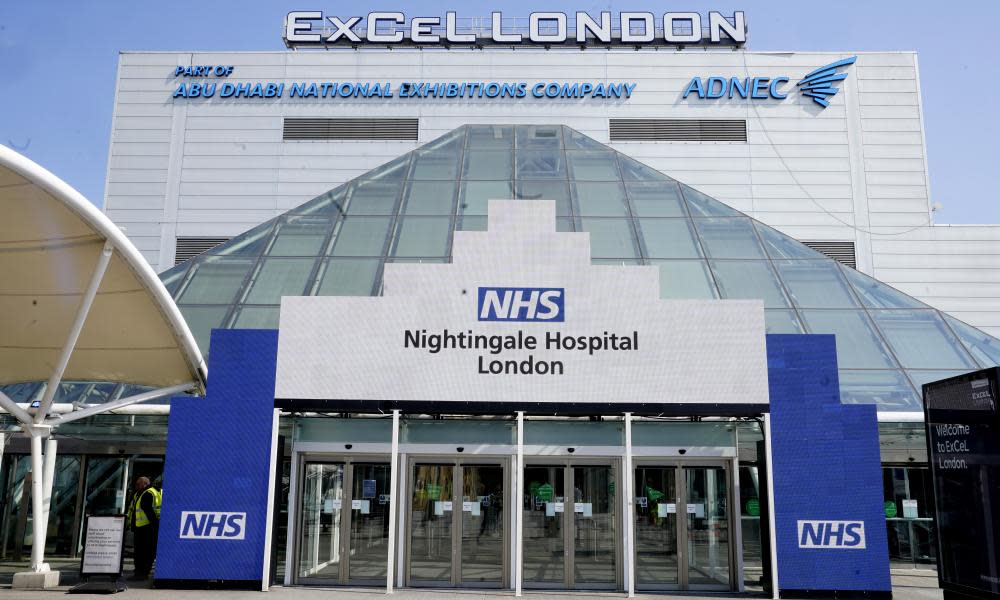The Observer view on government failure in the coronavirus crisis

Last week brought the tragic news of the first medical professionals to fall victim to Britain’s coronavirus epidemic. Dr Habib Zaidi was a community GP in Essex who died from suspected Covid-19 symptoms last Wednesday. Dr Adil El Tayarlar was a London-based organ transplant surgeon who believed he contracted the illness while working in hospitals in the West Midlands. There will very likely be more doctors, nurses and support staff who also lose their lives as a result of their critical work in treating patients with the virus. It is an appalling reminder that, every day, NHS and social care staff are putting their own lives at risk in order to save the lives of others.
In recent days, the effort to ramp up the NHS’s critical care capacity has been incredible. Work is well under way to build a new hospital at London’s Excel centre: from next week, NHS Nightingale will provide 500 beds, with space to expand to 4,000; an incredible 27-fold increase in the capital’s critical care beds. Similar hospital expansion programmes are getting under way in Birmingham and Manchester.
It will, however, take an immense human effort from doctors, nurses and support staff to keep the NHS on its feet. Medical professionals will be drafted in from around the country to staff these extra beds; many will live on site and work physically and emotionally exhausting shifts in barely tolerable conditions. Up and down the country, doctors and nurses have said goodbye to their nearest and dearest, moving out of their family homes, or are sending children to live with relatives, potentially for months, in order to avoid putting them at risk. It is utterly awe-inspiring, and we salute their dedication to service. It will not be forgotten.
But the dedication of medical professionals contrasts sharply with the lack of government preparedness – for example in procuring extra stocks of ventilators, personal protective equipment (PPE) and virus testing kits. It should have been clear from the evidence coming out of China from February onwards that the risks of a global pandemic, requiring significant additional medical resources, were very high indeed.
A health system driven to the absolute limits of its capacity will inevitably be less resilient
Yet it was only two weeks ago that the health minister, Matt Hancock, issued a public call for companies to contact the government and assist in ventilator production. Since then, extremely worrying details have emerged that suggest there was a lack of procurement competence within the government. Britain has not taken part in an EU joint procurement scheme for ventilators, which could have used the bloc’s collective purchasing power to increase the stock of ventilators that the NHS has access to.
At first, government sources claimed the UK decided not to participate because we are no longer a member of the EU, and that the UK was “making its own efforts” to source extra ventilators. Then we were told that the government had accidentally missed the deadline; this was put down to “an initial communication problem”. But Brussels publicly announced plans for a joint procurement process – widely reported in the press – weeks ago, and it has made clear that UK representatives were present at meetings where joint procurement was discussed.
This oversight does nothing to allay fears that the government may have passed up on the opportunity to take part in an EU initiative to procure life-saving equipment for ideological reasons. Moreover, existing ventilator manufacturers in the UK say that, despite contacting the government with offers to ramp up their production, they have had little response. One company, Direct Access, contacted the Department for Business after sourcing 5,000 ventilators but heard nothing back, and after a few days the supplies were directed elsewhere. Another supplier, MEC Medical, also said the government failed to respond to its offers to expand ventilator production.
There are also issues over the availability of PPE. Last week it emerged that in 2016 the Department of Health rejected expert advice to increase PPE stockpiles against the risk of an influenza pandemic on the grounds of cost. This decision has had consequences: medical professionals continue to report that there are still shortages of equipment at the frontline. Some NHS trusts have been asking schools to donate science goggles; and some doctors report that they have sourced and paid for their own protective masks. Staff remain concerned that the reason that the UK advice on protective equipment diverges from that of the World Health Organization in some instances is to preserve limited supplies, rather than set out best practice.
This is the sign of a health system that has been put under extreme pressure by inadequate levels of funding since 2010. A pandemic of this sort would always place intolerable strain on the NHS. But its impact will be worse as a result of a decade of underfunding that has left hospital bed occupancy rates regularly exceeding safe levels; elective operations cancelled due to capacity issues; critical care capacity at lower levels than most European countries; and a staffing crisis that has depleted the morale of frontline staff.
A health system driven to the absolute limits of its capacity will inevitably be less resilient to this sort of extraordinary crisis than one that has a little breathing room. There will be unnecessary and avoidable deaths as a result. Today, we should applaud the extraordinary efforts being made by many across government to ready the NHS for the tsunami that is about to hit it. But the time will come to hold accountable those politicians who were so keen to wield unnecessary budget cuts as a badge of their Conservative credentials, while paying little heed to the consequences of their actions.

 Yahoo News
Yahoo News 
